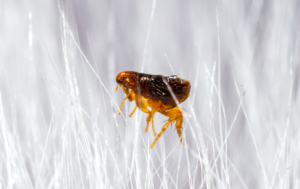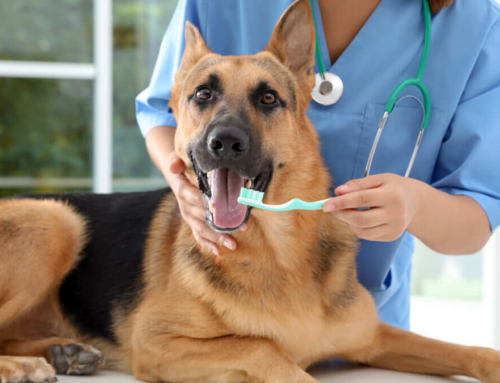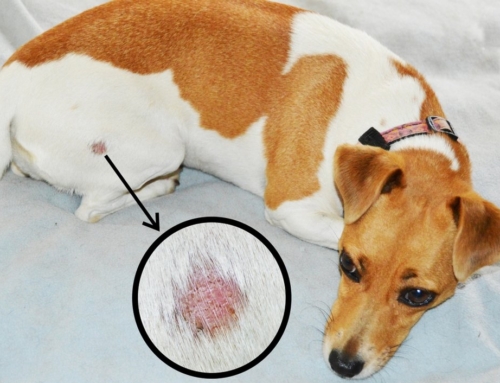Fall has arrived and people are rushing to coffee shops to fulfill their itch for pumpkin spice lattes.
Like humans, pets have an itch as well; but this itch is not a good thing. This itch is due to allergies. Similar to humans, dogs and cats can develop allergies as well. Their allergies may begin when they are young or it can develop over time as they grow older.
Between the two, dogs are usually more prone to developing an allergy compared to cats. As such, this blog will focus mainly on dogs.
Food Allergies
One of the types of allergies is a food allergy. This type is the most common and pretty easy to resolve. When a dog develops a food allergy, they will begin to lick their paws and scratch their ears. In early symptoms, this will cause the paws to become stained in red. But as time progresses, the paws and ears can become raw and painful to the touch, while also having significant hair loss. As such, it is important to recognize when your pet is having a food allergy. When these symptoms begin, the first step is to change the food that you are currently feeding. Even though your pet may have eaten this food before, there is a chance that they suddenly develop an allergy to one of the ingredients. The main ingredients that a dog will be allergic too are usually chicken and beef. So after removing the food, try replacing it with a duck based food product. If changing the food does not work, then the allergy may be an environmental allergy.
 Environmental Allergies
Environmental Allergies
Environmental allergies are not as common but are much harder to deal with. The symptoms of an environmental allergy are patches of area that may be itchy for the dog, while also may lick their paws and scratch their ears. One of the common environmental allergies is the place they are sleeping. This means that the bedding or sleeping area for the dog is causing it to have dermatitis. As a result, the owner should replace the bedding or anything that may be suspected to cause the allergy. If the dog or cat is having redness around the mouth, this may be an allergy towards their feeding dish. This usually occurs when the feeding dish is plastic. So, when this symptom is observed, the first thing to do is to replace the feeding dish with a non-plastic one. One last environmental allergy is the climate. For this specific allergy, sadly there is not much an owner can do. Try to recognize which climate or season is causing itching symptoms so you can be aware when the climate happens again.
Flea Allergies
 Flea allergies, also known as flea dermatitis is caused by the presence of fleas on the pet. This will cause the pet is scratch in the areas where fleas are usually higher in abundance: under the legs, behind the ears and the area before the tail. If your pet is scratching the area before the tail on their back and is not on flea prevention, there is a high chance that they have flea dermatitis. The areas of scratching will also result in redness, flakiness, and even severe hair loss if not dealt with for a long period of time. To resolve this issue, your pet needs to be rid of fleas using medication and put on flea prevention for at least three months; as fleas can survive in the environment even without a blood meal for that long of a period.
Flea allergies, also known as flea dermatitis is caused by the presence of fleas on the pet. This will cause the pet is scratch in the areas where fleas are usually higher in abundance: under the legs, behind the ears and the area before the tail. If your pet is scratching the area before the tail on their back and is not on flea prevention, there is a high chance that they have flea dermatitis. The areas of scratching will also result in redness, flakiness, and even severe hair loss if not dealt with for a long period of time. To resolve this issue, your pet needs to be rid of fleas using medication and put on flea prevention for at least three months; as fleas can survive in the environment even without a blood meal for that long of a period.
Unknown & Severe Allergies
There are cases where the reason for the allergy is unknown. In these scenarios, the pet can perform a blood test to see what product or environment they are most likely to be allergic too. These results are not guaranteed and only tell the owner what the pet can be allergic to the most. If cases of allergies are severe, medication (antihistamines) will be given either as a one time option to stop the allergy immediately or throughout the pet’s entire life. Antibiotics and pain medication may also be given if the side effects of the allergy are causing harm to the pet, such as pain or raw skin.
To the surprise of many pet owners, allergies are very common in pets. As such, it is important to recognize the symptoms and change the products immediately to prevent symptoms from getting worse. If you are ever unsure whether or not your pet is having an allergy, bring them to Central Park Animal Hospital and we will try our best to figure out what they are allergic to and provide you with important to prevent the issue from occurring again!
Alwin Chan – October 2019






